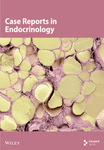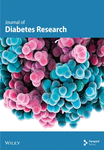Journal list menu
Export Citations
Download PDFs
Editorial
Open Access
oa
Characterization of Former Gestational Diabetes Mellitus: Prognostic, Therapeutic, and Predictive Aspects
- First Published: 23 August 2012
Review Article
Open Access
oa
Gestational Diabetes Mellitus: A Positive Predictor of Type 2 Diabetes?
- First Published: 23 May 2012
Clinical Study
Open Access
oa
Gestational Diabetes and Thyroid Autoimmunity
- First Published: 13 May 2012
Clinical Study
Open Access
oa
Quality of Life, Wishes, and Needs in Women with Gestational Diabetes: Italian DAWN Pregnancy Study
- First Published: 26 April 2012
Clinical Study
Open Access
oa
Elevation of sE-Selectin Levels 2–24 Months following Gestational Diabetes Is Associated with Early Cardiometabolic Risk in Nondiabetic Women
- First Published: 22 April 2012
Clinical Study
Open Access
oa
Incretin Effect in Women with Former Gestational Diabetes within a Short Period after Delivery
- First Published: 19 April 2012
Clinical Study
Open Access
oa
Risk Factors for Gestational Diabetes Mellitus in a Large Population of Women Living in Spain: Implications for Preventative Strategies
- First Published: 12 April 2012
Clinical Study
Open Access
oa
1-Hour OGTT Plasma Glucose as a Marker of Progressive Deterioration of Insulin Secretion and Action in Pregnant Women
- First Published: 10 April 2012
Review Article
Open Access
oa
Role of Adipokines and Other Inflammatory Mediators in Gestational Diabetes Mellitus and Previous Gestational Diabetes Mellitus
- First Published: 09 April 2012
Clinical Study
Open Access
oa
Pilot Study of an Individualised Early Postpartum Intervention to Increase Physical Activity in Women with Previous Gestational Diabetes
- First Published: 04 April 2012
Clinical Study
Open Access
oa
Fetuin-A Characteristics during and after Pregnancy: Result from a Case Control Pilot Study
- First Published: 28 March 2012
Clinical Study
Open Access
oa
How Can We Increase Postpartum Glucose Screening in Women at High Risk for Gestational Diabetes Mellitus?
- First Published: 25 March 2012
Clinical Study
Open Access
oa
Changes in Maternal Glucose Metabolism after the Administration of Dexamethasone for Fetal Lung Development
- First Published: 25 March 2012
Review Article
Open Access
oa
Previous Gestational Diabetes Mellitus and Markers of Cardiovascular Risk
- First Published: 18 March 2012
Clinical Study
Open Access
oa
A Pilot Study on Dietary Approaches in Multiethnicity: Two Methods Compared
- First Published: 15 March 2012





